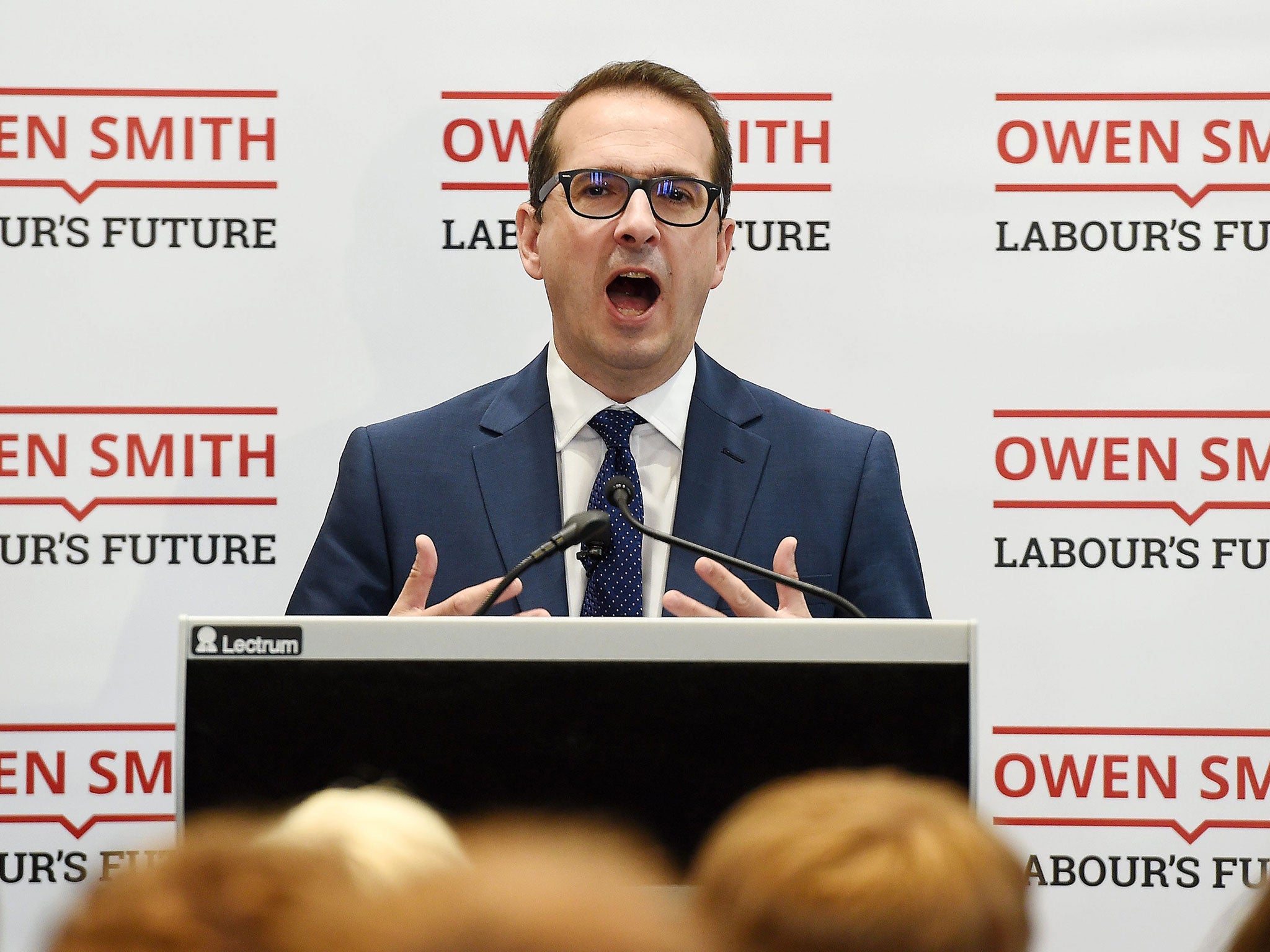If you want to know why Owen Smith carries on making sexist remarks, take a look at where he comes from
In the run-up to last year’s general election, I interviewed Leanne Wood and asked her why she'd joined Plaid Cymru rather than the Labour Party. Her reply? 'There was no place for a young woman with views like mine in the Labour party in the Rhondda'

When it comes to political pulling power, it’s (mercifully) the ballot box that comes to mind, not the bedroom. Thankfully, Labour leadership candidate Owen Smith this weekend claimed he has both forms of seduction covered, having boasted in an interview with the Daily Mirror that his success in “pulling” his now-wife Liz despite furious competition from other lads shows that he knows how to win. (The following sentence has been donated free of charge in order to give readers time and space to cringe.)
If there were any women out there who believed the era of political laddish machismo was over, the last few months of the leadership campaign have swiftly disabused us of that notion. The British political left has a woman problem; of that there is no question. As the Tories anointed their second female leader and PM, Angela Eagle – a highly impressive politician whatever you think of her views – stood aside for a man who, despite his main selling point allegedly being that of competence, appears to continually put his foot in it with regards to gender.
The boast is just the latest in a string of gaffes that have seen Smith accused of sexism. A tweeted remark about Nicola Sturgeon – another highly competent female politician who in the aftermath of the referendum result put the bumbling of the male players to shame – needing a gobstopper to shut her up was dismissed last week as political “banter", an excuse with which we walking wounded from Britain’s laddish schools and university campuses will be warily familiar. Smith’s wife-winning skills might see him considered a “legend” by a certain genre of “lad”, but there are those of us who have had such a bellyful of this kind of macho entitlement in our day-to-day lives that we can very much do without getting it from our political representatives as well.
That’s not to say that Corbyn’s track record on women has been without fault. Gender is a problem throughout the Labour movement. The recent Vice documentary about Corbyn’s leadership revealed a disappointingly male inner circle. The letter from female Labour MPs requesting that Corbyn take the abuse of female politicians more seriously is also concerning. But Smith, well: I know a brocialist when I see one – Lord knows I met enough of them at university, these men who lay claim to progressive ideas but then demonstrate a bemusing blind spot in the way they treat or talk about women. I can’t see Corbyn, for instance, using domestic violence as political analogy (in a 2010 article for WalesHome, Smith wrote of the coalition government that “surely, the Liberals will file for divorce as soon as the bruises start to show through the make-up?”), nor talking about “smashing” Theresa May “back on her heels.” I have female friends who have serious reservations about Corbyn but are voting for him because they are sick to the back teeth of the kind of remarks made by Smith.
Yet Smith recently had the audacity to claim that misogyny in the Labour party was a recent invention, saying in a BBC interview that “we didn’t have this sort of abuse and intolerance, misogyny, antisemitism in the Labour party before Jeremy Corbyn became the leader.” More than any other, this claim provoked a bitter laugh. Honestly: the sheer brass balls of the man, shaped as he is by the South Welsh Labour heartlands. At best, the pit towns and valleys that birthed Smith could never be said to be bastions of modern, forward-looking gender attitudes. At worst, they embody the kind of macho, industrialist, working men’s sexism that belongs in the nineteenth century.
Sadly that sexism is an integral part of the history of the Labour party, founded as the movement is by many communities where men worked in single “heavy” industries and women’s roles were restricted to home-making. Though the miner’s strike saw a shift in such attitudes, their residue remains.
In the run-up to last year’s general election, I interviewed another impressively competent female politician – Leanne Wood, the leader of Plaid Cymru, a passionate socialist and Rhondda girl through and through. It would have been around the time that Smith was caught on camera suggesting to Wood that prior to an election debate that her gender is the reason she gets more invites to appear on Question Time. Wood came from a traditional Labour family, so why, I asked her, did she join Plaid Cymru at the age of 20, after having attended university in Smith’s constituency of Pontypridd, rather than Labour? Was to do so not a betrayal?
This was her answer: “The Labour party was never an option for me because in the Valleys they had been in power for such a long time that they had … a strong sense of entitlement, and I found that many of the politicians – particularly at local government level – had quite right wing, reactionary views, and so there was no place for a young woman with views like mine in the Labour party in the Rhondda.” When pressed on what kind of reactionary views she was referring to, she elaborated: “Sexist, homophobic – just generally old fashioned dinosaur politics, which in my view had no place in my life.”
Women have truly had enough of dinosaurs. We’ve been waiting an age for our bread and our roses. There are some startlingly talented women in the Labour Party, and some of them – Lisa Nandy, for one – have defended Smith against accusations of sexism. But we are all products of our environments, and the one Wood describes is Smith’s. That the retrograde attitudes rife in post-industrial regions such as the South Wales valleys have played a role in keeping talented Labour women from rising in the ranks I have no doubt. In other parties, women are on the up.
The success and popularity of Leanne Wood, Nicola Sturgeon and even Theresa May contrast with a Labour party that increasingly resembles a living fossil, where men who imply women are wives, victims, prizes to be won, with gobs that need stopping, can nonetheless rise from obscurity where more polished, passionate and progressive women are left behind. As a young female voter observing yet another leadership battle between two men, and hearing a brilliant woman like Leanne Wood saying Labour had no place for her, it is highly dispiriting. The pits are closed. It’s time to stop mining the past.


Join our commenting forum
Join thought-provoking conversations, follow other Independent readers and see their replies